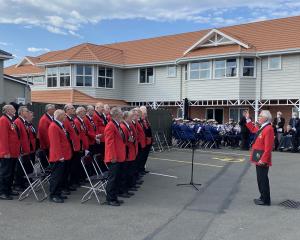Gut instinct would have prodded John Key to cut short his Middle East trip immediately he was told of the Anzac Day helicopter crash.
It was the correct option to take - in fact, the only option really - even though it meant the Prime Minister had to desert the New Zealand trade mission to the Gulf which he was supposed to be leading in the aftermath of his attending this year's commemorations at Gallipoli.
That was unfortunate - and Mr Key has had to wear a mixture of noisy, muted and stifled criticism for leaving the 90-strong delegation in the lurch, though not from political opponents who well understood he had to be at the Ohakea funeral for the three servicemen who were killed when their Air Force Iroquois crashed into a hillside north of Wellington.
Their deaths cut deep into the New Zealand psyche on a day when tributes are paid to the more than 29,000 New Zealanders who have died for their country - a day which has become a surrogate means for highlighting national identity without the complications that have plagued Waitangi Day.
Those special circumstances dictated that the Prime Minister be at the funeral - rather than another Cabinet minister or some other emissary deputising for him.
But once Mr Key was back in New Zealand, gut instinct should have told him to stay at home, rather than reverting to his original schedule and his not-so-secret mission to Afghanistan.
The delights of Kabul could have waited for another occasion.
While prime ministers relish the feelgood vibes of being pictured rubbing shoulders with Kiwi troops in war zones, such exercises can be a double-edged sword.
Travel may broaden the mind, but it can also shrink poll ratings as fast as raising them.
Mr Key's priorities reside at home.
It is no coincidence that the Government seems to lose some of its focus and direction when he is overseas.
Not to a large degree, mind you.
But enough to be noticeable and enough to worry some senior MPs.
Mr Key is such a dominant figure in this Government that for many voters he is National and vice-versa.
As National's brand, he thus leaves a gaping hole in the fabric of the Government when he goes overseas.
It is not possible to run the country from a hotel suite on the other side of the world.
Next year being election year, however, Mr Key's 2010 diary is packed with overseas travel commitments.
He should be wary.
On the verge of its second and most important Budget of the electoral cycle, his Government has reached a critical juncture.
Business expects the Budget to deliver the goods in terms of policies which will lift New Zealand's sluggish growth rate.
It is put up or shut up time for Mr Key and Bill English. It is time to show some spine.
The verdict of the business world will be harsh if there is little in the way of economic instruments beyond the already-known package of income tax cuts.
Yet, as much as the Government is accused of being craven to public opinion, it is in great danger of getting too far ahead of public opinion in other areas.
That is most evident in the concessions being made to the Maori Party and Maori generally in National's rush to close off the treaty settlement process.
Mr Key, a firm believer that National's continued courting of Maori is vital to his party's long-term grip on power, has so far avoided a backlash from Pakeha despite the best efforts of Act, National's support partner, to provoke one.
Ever cheerful, always unflappable and unfailingly positive, Mr Key has been able to charm the electorate and divert attention away from less popular things his Government has been doing.
He has been really pushing his luck on the Maori front, however.
In his roles of Attorney-general and Treaty Negotiations Minister, Chris Finlayson has been ultra-careful in handling the sensitivities surrounding Maori claims to the foreshore and seabed.
However, the mounting list of concessions to the Maori Party - be it the foreshore and seabed, whanau ora or endorsing the United Nations Declaration on the Rights of Indigenous Peoples - is testing the limits of such political management and starting to test the patience of National's bedrock support.
Things might well have boiled over with the treaty settlement at present being negotiated with Tuhoe, which includes a radical proposal to vest ownership of the Urewera National Park in the iwi.
It seems some ministers understandably got the heebie-jeebies at the prospect of National not only allowing mining in national parks, but also handing a whole park to Maori on top of that.
It takes some doing to offend both the liberal and conservative wings of your own party.
But National's hierarchy is straying perilously close to doing so.
Just what the party faithful actually think of all this should become apparent at National's Wellington regional conference today - the first of five such regional meetings.
What is not in doubt is that National's intention to allow mining operations in national parks and other portions of the Conservation estate deemed to be of high ecological value has exposed the haphazard nature of the Government's supposed political management process.
No strategy - communications or otherwise - seems to have been put in place to sell the potential benefits of the mining policy.
Such a strategy was essential, given National is on the wrong side of public opinion to a degree this administration has not experienced before.
Instead, this fiasco has highlighted the extent to which National, at times, has been flying by the seat of its pants when it comes to managing tricky issues.
National is now stuck between a rock and a hard place.
The business world clearly sees the mining policy as the real test of the Key Government's willingness to make the hard decisions.
Yet, the policy is so despised by a wider public that sticking with it is now political folly.
This fiasco could have been avoided if National had the gatekeeping procedures that Labour established in government to pick up problems in ministers' portfolios and in relations with support partners before they became public.
Helen Clark may have travelled overseas as much if not more than John Key.
But part of her never left the country.
In Heather Simpson, she had a chief of staff who provided the necessary scrutiny of the mountain of paper that crosses the Prime Minister's desk.
There wasn't much which escaped her attention.
Mr Key operates a less constrictive, looser form of oversight of his ministers.
But things seem to get even looser in his absence.
While individual ministers are going hell-for-leather in pushing ahead with reforms in their portfolios, presenting them together in a coherent fashion, which allows voters to gauge where the Government is heading seems to be of secondary importance.
It is no coincidence that the mistaken notion that the Government has no plan - particularly in terms of economic policy - is once again starting to gain currency.
The Budget should eradicate that myth and provide a much-needed overview and update of exactly where the Government is going.
Its delivery is still more than a week away.
But for National's sake it cannot come soon enough.
• John Armstrong is political correspondent for The New Zealand Herald












